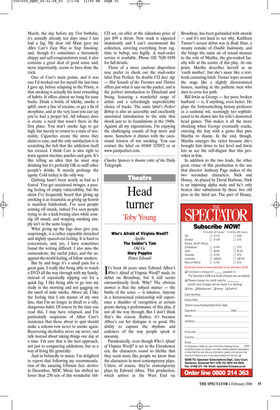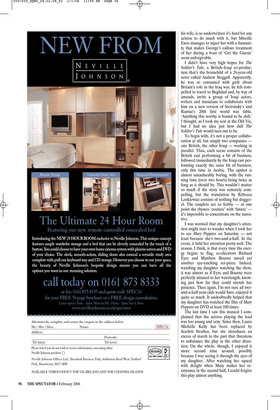Head turner
Toby Young
Who’s Afraid of Virginia Woolf? Apollo The Soldier’s Tale Old Vic Mary Poppins Prince Edward It’s been 44 years since Edward Albee’s Who’s Afraid of Virginia Woolf? made its debut on Broadway, but it still seems extraordinarily fresh. Why? The obvious answer is that the subject matter — the battle of the sexes — is timeless. Anyone in a heterosexual relationship will experience a shudder of recognition at certain points during a performance of this play, if not all the way through. But I don’t think that’s the reason. Rather, it’s because Albee’s ear for dialogue is so good. His ability to capture the rhythms and cadences of the way people speak is uncanny.
Paradoxically, even though Who’s Afraid of Virginia Woolf? is set in the Eisenhower era, the characters sound so lifelike that they seem more like people we know than the characters in most contemporary plays. Unless, of course, they’re contemporary plays by Edward Albee. This production, which arrives in the West End via Broadway, has been garlanded with awards — and it’s not hard to see why. Kathleen Turner’s screen debut was in Body Heat, a steamy remake of Double Indemnity, and she brings the same air of sexual menace to the role of Martha, the gin-soaked faculty wife at the centre of this play. At one point, Martha describes herself as an ‘earth mother’, but she’s more like a textbook castrating bitch. Turner lopes around the stage like a slightly disorientated lioness, snarling at the pathetic men who dare to cross her path.
Bill Irwin as George — her poor, broken husband — is, if anything, even better. He plays the fortysomething history professor as a sardonic wit, seemingly too sophisticated to be drawn into his wife’s demented head games. This makes it all the more shocking when George eventually cracks, entering the fray with a gusto that puts Martha to shame. In the end, though, Martha emerges the victor because she’s brought him down to her level and Irwin lets us see the self-disgust that this provokes in him.
In addition to the two leads, the other great virtue of this production is the use that director Anthony Page makes of the two secondary characters, Nick and Honey. As played by David Harbour, Nick is an imposing alpha male and he’s only beaten into submission by these two old pros in the third act. The part of Honey, his wife, is so underwritten it’s hard for any actress to do much with it, but Mireille Enos manages to inject her with a humanity that makes George’s callous treatment of her during a bout of ‘Get the Guests’ seem unforgivable.
I didn’t have very high hopes for The Soldier’s Tale, a British–Iraqi co-production that’s the brainchild of a 26-year-old actor called Andrew Steggall. Apparently, he was so consumed with guilt about Britain’s role in the Iraq war, he felt compelled to travel to Baghdad and, by way of amends, invite a group of Iraqi actors, writers and musicians to collaborate with him on a new version of Stravinsky’s and Ramuz’s 20th first world war fable. ‘Anything this worthy is bound to be dull,’ I thought, as I took my seat at the Old Vic, but I had no idea just how dull The Soldier’s Tale would turn out to be.
To begin with, it’s not a proper collaboration at all, but simply two companies one British, the other Iraqi — working in parallel. Thus, each scene consists of the British cast performing a bit of business, followed immediately by the Iraqi cast performing exactly the same bit of business, only this time in Arabic. The upshot is almost unendurably boring, with the running time (over two hours) being twice as long as it should be. This wouldn’t matter so much if the story was remotely compelling, but the translation by Rebecca Lenkiewicz consists of nothing but doggerel. The couplets are so feeble — at one point she rhymes ‘couture’ with ‘future’ — it’s impossible to concentrate on the narrative.
I was worried that my daughter’s attention might start to wander when I took her to see Mary Poppins on Saturday — not least because she’s two-and-a-half. In the event, it held her attention pretty well. The reason, I think, is that every time the energy begins to flag, co-directors Richard Eyre and Matthew Bourne unveil yet another eye-catching set-piece. Indeed, watching my daughter watching the show, it was almost as if Eyre and Bourne were perfectly attuned to her wavelength, knowing just how far they could stretch her patience. Then again, I’m not sure all twoand-a-half-year-olds would have enjoyed it quite so much. It undoubtedly helped that my daughter has watched the film of Mary Poppins on DVD at least 100 times.
The last time I saw this musical I complained that the actress playing the lead was too young and sexy. Since then, Laura Michelle Kelly has been replaced by Scarlett Strallen, but she introduces an excess of starch to the part that threatens to unbalance the play in the other direction. On the whole, though, I enjoyed it more second time around, possibly because I was seeing it through the eyes of my daughter. After watching her squeal with delight when Mary makes her reentrance in the second half, I could forgive this play almost anything.






























































































































 Previous page
Previous page